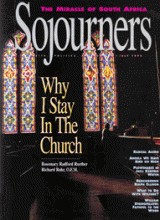The life and writings of William Stringfellow, a Sojourners contributing editor until his death in 1985, have greatly influenced Christian peace and justice movements, communities, and theologians. He was especially instrumental in developing a theology of the powers and principalities. Students of Stringfellow know, however, that it is difficult to secure copies of his books, as all 15 of them are now out of print.
Bill Wylie Kellermann, one such student and also a Sojourners contributing editor, took on the task of editing and compiling a Stringfellow ôreaderö so that his influence could be preserved and even reinvigorated. A Keeper of the Word: Selected Writings of William Stringfellow (Eerdmans Publishing Co., 1994) is the result of Kellermann's labor of love. What follows are excerpts from the compilationùa portion of the introduction by Kellermann and a selection from Stringfellow's 1966 book, Dissenter in a Great Society. -- The Editors
Although he sometimes smarted under his recurrent designation as a "lay theologian," and even though he wrote some 15 books and scores of theological articles (no small volume given his fragile and often perilous health, his work as a lawyer, or his political and pastoral involvements), William Stringfellow never considered himself to have a vocation as a theologian. Even less did he envision a theological "career." Writing theology was something he did. It was part of his work. He suffered it. He enjoyed it. He spent himself offering it as a gift, sometimes unwelcome, to the church.
Likewise, though he was trained at Harvard Law School, and practiced first in Harlem and then on Block Island, much the same may be said of his work as a lawyer. He did not count it his vocation, nor did he brook any career. Careers, as a matter of fact, he counted among the principalities. As he put it succinctly, in his conversion he "died to career."
Read the Full Article

